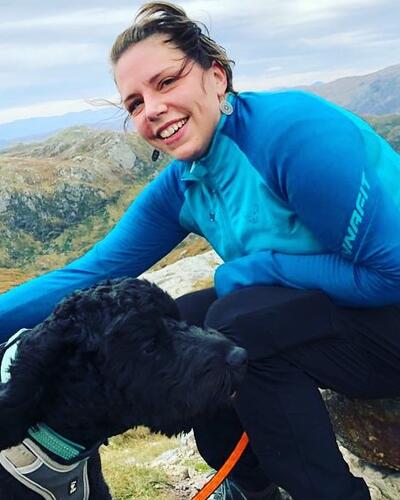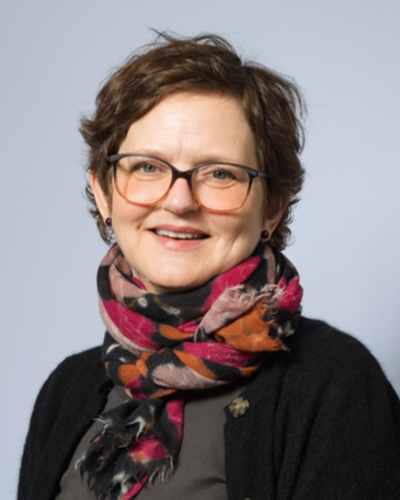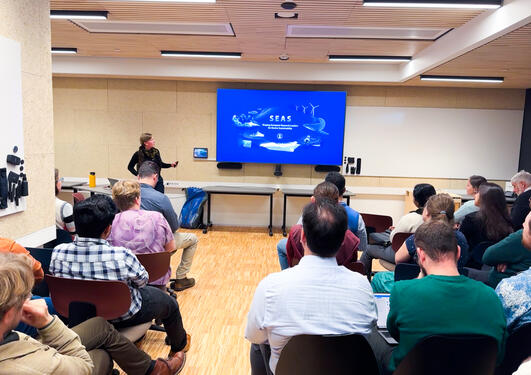SEAS fellows exploring interdisciplinary approaches
How do you get a group of social scientists, biologists, oceanographers, mathematics and informatics scientists to find common ground? How do they overcome their differences in background, methodology and language to unite to address questions and issues that span their different disciplines? Maybe by sending a group of SEAS fellows out into the fjords for a couple of days of isolation and focus, in the beautiful surroundings of Lofthus in Hardanger.

Main content
This breadth of interests and disciplines is at the heart of the SEAS Programme. The acronym SEAS stands for “Shaping European Research Leaders for Marine Sustainability” and is a career and mobility fellowship programme where 37 postdoctoral researchers from all over the world have 3 years to develop and run their own research project within the broad field of marine sustainability. Their varied academic backgrounds and scientific methods are exactly what makes the inter- and trans-disciplinary focus of the larger programme possible.
EU funding
The SEAS programme has a total scope of NOK 160 million and ensures that the candidates go through a joint career development program. The programme has received 4 million Euro in funding from the European Union’s Horizon 2020 research and innovation programme under the Marie Skłodowska-Curie grant agreement No 101034309.
The first group of SEAS fellows arrived in Bergen in 2022 – with many of these wrapping up their projects within the next 6 - 12 months. Three more groups arrived over the two following years to bring numbers to the current 36 fellows, with one left to start 2024.
With interdisciplinarity one of the goals of the SEAS Programme, 11 of the SEAS fellows recently sat down for a workshop in beautiful Lofthus, Hardanger – sparring on ways to find interdisciplinary approaches to some hypothetical projects, as well as some more specific projects aimed at producing joint journal articles or funding proposal.
Tuna fishing in Oceania involves all the dimensions of sustainability by raising acute questions of environmental, economic, social, and political importance, Ola Berta says.
Deep-sea mining
Some of discussions were sparked by details from individual research fields, such as tuna migration affecting the fishing community of the Marshall Islands – with fellows from other disciplines considering questions that might be pertinent from their own fields. SEAS fellow Ola Berta did field work in the Marshall Island and sees many aspects with potential for interdisciplinary cooperation in his findings.
– Tuna fishing in Oceania involves all the dimensions of sustainability by raising acute questions of environmental, economic, social, and political importance. From warming seas, to shifting migration patterns, state sovereignty to slave labour, overfishing to unequal global exchange – tuna fishing has it all, Ola Berta says.
Later discussions developed on the idea of knowledge gaps in specific discipline-crossing topics – in particular deep-sea research. The latter topic will be developed further beyond the Lofthus discussions and will be part of a continued collaboration from a smaller group of workshop attendees, spurred by lively discussions at the getaway, breaking the topic down to elements like “seabed classification” and “marine spatial planning”.

LIVELY DISCUSSIONS: Claudiu Eduard Nedelciu keeping track of the different elements of the interdisciplinary discussions.
SEAS fellow Claudiu Eduard Nedelciu will be part of a smaller group continuing the interdisciplinary approach from the Lofthus workshop:
– In my project I examine narratives and discourses around deep-sea mining, which is the hot potato in deep-sea research now. I got to find out more about the deep-sea research that several of the SEAS fellows are doing, and I can see some collaborative research avenues both methodologically and topically. With so much general interest on deep-sea mining and deep-sea research, I think this is a promising start. We already mapped out next steps, and I´m looking forward to continuing the work we started at the workshop, says Claudiu Eduard Nedelciu.
– The interdisciplinary workshop in Lofthus has been a great occasion to find out where our work as SEAS fellows overlaps. We aim to build on this, in smaller, more focused groups says informatics researcher, Chloe Game, who joined the SEAS Programme in June 2024.


